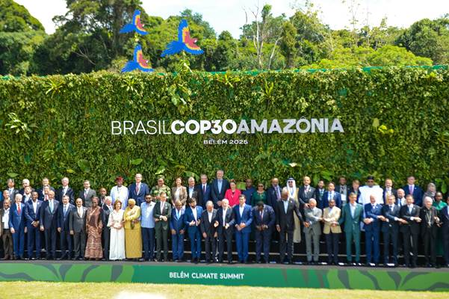Belem (Brazil): Going into United Nations climate negotiations, the Brazilian hosts weren’t looking for big end-of-session pronouncements on lofty goals. This conference was supposed to hyperfocus on “implementation” of past promises not yet kept.
Throw that out the window.
The urgency of climate change is causing some negotiators to push for more big-picture action — on weak plans to cut emissions of heat-trapping gases, on too little money to help nations wracked by climate change, on putting teeth into phasing out coal, oil and gas. Because of that pressure to do more — including from Brazilian President Luiz Inacio Lula da Silva — the diplomat chairing the talks said on Saturday he’ll consider a big-picture, end-of-negotiations communique, sometimes known as a decision or cover text.
“I think things have changed, which is a very good thing,” said veteran observer Jean Su of the Centre for Biological Diversity. “So I think there’s momentum that we will get some type of decision text, and our hope is that, in particular, there’s going to be some commitment on phasing out fossil fuels.”
“I would say that what’s at stake now is probably higher than the last several COPs because you’re looking at an ambition gap,? Said former Philippine negotiator Jasper Inventor, international program director at Greenpeace International. “There’s a lot of expectation, there’s a lot of excitement here, but there’s also a lot of political signals that have been sent by President Lula.”
“We’re in the middle of the COP, and at the middle of COP is usually where the negotiators stare each other eye-to-eye. It’s almost like a staring contest,” the Inventor said. “But next week, this is where the negotiations need to happen, where political decisions are made by the ministers.”
Because this process stems from the Paris Climate Agreement, which is mostly voluntary, these end statements grab headlines and set global tone but have limited power. The last few COP end statements have made still-unfulfilled pledges for rich countries to give money to poor nations to cope with climate change and for the world to phase out fossil fuels.
Decision time
Key among those issues is the idea of telling nations to go back to the drawing board on what experts consider inadequate climate-fighting plans submitted this year.
In the 2015 Paris agreement, which is being celebrated here on its 10th anniversary, nations are supposed to have submitted climate-fighting, emissions-curbing plans every five years. So far, 116 of 193 countries have filed theirs this year, but what they promised isn’t much. The United Nations and Climate Action Tracker, a group of scientists, calculates that these new pledges barely reduced future projections for Earth’s warming.
Even if the world does all it promises, Earth would be about seven-tenths of a degree Celsius (1.3 degrees Fahrenheit) above the Paris goal of limiting warming to 1.5 degrees Celsius (2.7 degrees Fahrenheit) above pre-industrial times, the groups estimated.
So small island nations, led by Palau, asked that this conference confront the gap between what’s planned in national pledges and what’s needed to keep the world from hitting the temperature danger zone.
That’s not on the agenda for these talks. Nor are there specific details on how to fulfil last year’s pledge by rich nations to provide $300 billion annually in climate financial aid.
So when nations early on wanted to address these issues, COP President André Corrêa do Lago, a veteran Brazilian diplomat, set up special small confabs to try to decide if the controversial topics should be discussed.
On Saturday, the conference punted the issue to the incoming ministers.
“The parties will decide how they want to proceed,” Lago said at a Saturday evening news conference. Given what countries are saying and past history, that usually means a final end-of-COP message to the world, several experts said.
In a casual exchange with a reporter about how the conference is going, COP President do Lago said: “Eh, could be better but not as bad as it could be.”
Momentum to phase out fossil fuels
UN General Assembly President Annalena Baerbock, the former German foreign minister who has been to 10 of these sessions, told The Associated Press Saturday morning before the evening’s session that she saw “new momentum” in Belem.
“We can fight the climate crisis only together if we commit to a strong mitigation target,” she said. “This means also transitioning away from fossil fuels, investing in renewable energy.”
Two years ago in Dubai, the world agreed to “transition away from fossil fuels,” but last year, no mention of that was made, and there’ve been no details on how or when to do this.
Baerbock hailed as crucial Lula’s call during the Leaders’ Summit last week for “a road map for humanity to overcome, in a just and planned way, its dependence on fossil fuels, reverse deforestation, and mobilise the resources needed to do so.”
“I think what we have before us are the ingredients of a potential high-ambition package for the outcome of this conference,” Iskander Erzini Vernoit, executive director of the Moroccan IMAL Initiative for Climate and Development, said.
Getting Indigenous voices heard
Indigenous groups breached and blockaded the venue twice this week with demands to be further included in the UN talks, despite this conference’s promotion as the “Indigenous Peoples’ COP.”
The COP so far “was a testament that, unfortunately, for Indigenous peoples to be heard, they actually need to be disruptive,” said Aya Khourshid, an Egyptian-Palestinian member of A Wisdom Keepers Delegation, a group of Indigenous people from around the world.
Indigenous people are putting a lot of energy “to be in this space but to not necessarily be given a platform or voice at the decision table with the ministers and those who are in power,” said Whaia, a Ngati Kahungunu Wisdom Keeper.
“There’s an imbalance here at COP30,” she said. “There’s the privileged and the not-so lucky who don’t get a say on what’s actually going on in their own home.
AP
